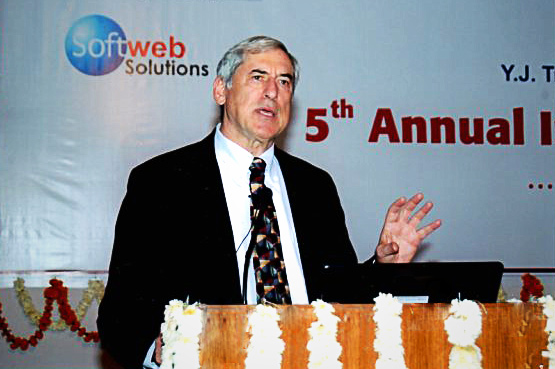
Abe Hershkovitz during his IPR Summit 2012 presentation on "Reexamination Practice Before the USPTO" in Ahmedabad, India
As at no other time in history, the internet has caused an information explosion heard around the world, and universal changes brought about by modern computing. Now, more than ever, protection of IP, and most notably of patents, becomes imperative for the economic stability and development of the global village. This view is confirmed by, arguably, the most sweeping changes in United States patent law in over 100 years.
On September 16, 2011, President Obama signed into law the Leahy-Smith America Invents Act. This Act includes reforms of unprecedented magnitude, such as a change from “first to invent” to “first to file” that will now determine patent rights, and make significant post-issuance changes in the review and reexamination processes, reforms aimed at confirming the validity of issued U.S. patents. More and more companies and inventors have either been the target of, or have themselves initiated, a challenge to the validity of the claims of a competitor or pursued aggressively potential infringers. It is envisioned that the provisions of the new U.S. patent laws and regulations to be implemented could reduce litigation in Courts, but increase disputes and prosecution before the USPTO. U.S. and Indian patent firms will likely form strategic alliances to reduce litigation costs for their clients by employing additional prosecution steps before the USPTO like pre-grant reviews and post-grant reissue and reexamination. Successful validity and reexamination practice requires exhaustive searching of available prior art, analysis of that art, and making strategic decisions relative to modifying the original claims, adding new ones, etc.
U.S. practitioners will try to make use of the additional mechanisms to evaluate and re-evaluate the validity of the claimed invention, not just before issuance of a patent, but also by use of the new “post-grant review” process for a period of 18 months directly after issue, and the new rigorous “inter partes review” at no less than nine months after issuance.
It is foreseen that India, with its wealth of highly talented and educated professionals, will likely play a major global role in delivering the support needed by the prosecution and litigation firms to fully comply and take advantage of new U.S. patent laws, and to help reduce the costs associated with resolving patent validity disputes for their clients.
Article by Abe Hershkovitz, published in “Summit Today” by the 5th Annual Intellectual Property Rights Summit held January 2012 in Ahmedabad, India.


